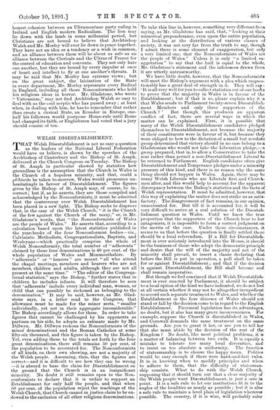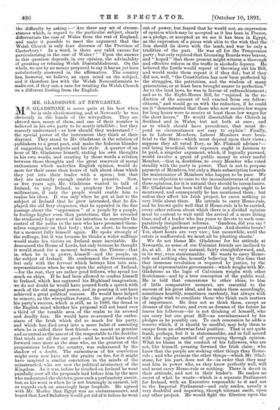WELSH DISESTABLISHMENT. T HAT Welsh Disestablishment is not so easy a
question as the leaders of the National Liberal Federation would have us believe, is shown by the speeches of the Archbishop of Canterbury and the Bishop of St. Asaph, delivered at the Church Congress on Tuesday. The Bishop• of St. Asaph in particular showed by statistics how groundless is the assumption that the Church in Wales is the Church of a hopeless minority, and that, could a plebiscite be taken to-morrow, Wales would pronounce un- hesitatingly in favour of Disestablishment. The figures given by the Bishop of St. Asaph may, of course, be in- correct ; but if, as he asserts, they are those compiled and acknowledged by the Nonconformists, it must be admitted that the controversy over Welsh Disestablishment has been placed in a new light. The Bishop seeks to disprove that, in the case of the Welsh Church, "it is the Church of the few against the Church of the many," or, in Mr. Gladstone's words, that "the Nonconformists of Wales are the people of Wales." He asserts that, according to a calculation based upon the latest statistics published in the year-books of the four Nonconformist bodies—viz., Calvinistic Methodists, Congregationalists, Baptists, and Wesleyans—which practically comprise the whole of Welsh Nonconformity, the total number of " adherents " claimed by these four denominations is 46 per cent. of the whole population of Wales and Monmouthshire. By " adherents " or " hearers " are meant "all who attend the chapel meetings, members and hearers who are not members, children and adults, although they are not all present at the same time." "The editor of the Congrega- tional statistics," says the Bishop, "further states that in children he includes infants. It will therefore be seen that 'adherents' include every individual man, woman, or child that can possibly be reckoned as belonging to the denomination." It may be said, however, as Mr. Glad- stone says, in a letter read to the Congress, that allowance must be made for the minor sects, "smaller individually, yet not in their aggregate inconsiderable." The Bishop accordingly allows for these. In order to take figures that cannot be challenged by his opponents as partisan on his side, he adopts an estimate made by Mr. Dillwyn. Mr. Dillwyn reckons the Nonconformists of the minor denominations and the Roman Catholics at some fifty-six thousand, and this figure is taken by the Bishop. Yet, even adding these to the totals set forth by the four great denominations, there still remains 50 per cent. of the population to be accounted for. The Nonconformists of all kinds, on their own showing, are not a majority of the Welsh people. Assuming, then, that the figures are correct—and it is difficult to see how they can be wrong —it is absurd to base the claim for Disestablishment on the ground that the Church is in an insignificant minority. No doubt it still remains open to the Non- conformists to declare that it is unfair to support an Establishment for only half the people, and that when 50 per cent. of the population reject the teachings of the Welsh Church, that Church cannot in justice claim to be en- dowed to the exclusion of all other religious denominations. To take this line is, however, something very different frora saying. as Mr. Gladstone has said, that, "looking at their numerical preponderance, even upon the entire population, and looking at the distribution of various classes of society, it was not very far from the truth to say, though I admit there is some element of exaggeration, but only a very limited one, that the Nonconformists of Wales are the people of Wales." Unless it is only "a limited WA- aggeration " to say that the half is equal to the whole, Mr. Gladstone's statement and the inferences drawn from it are utterly untrustworthy.
We have little doubt, however, that the Nonconformists will meet the Bishop's argument with a plea which unques- tionably has a great deal of strength in it. They will say: 'It is all very well for you to collect statistics out of our boas to prove that the majority in Wales is in favour of the Establishment ; but if that is so, please explain why it is that Wales sends to Parliament twenty-seven Disestablish- ment Members and only three supporters of the Church ? ' But though this produces an apparent conflict of fact, there are several ways in which the matter can be explained. First, it is possible that many of the Welsh Disestablishment candidates pledged themselves to Disestablishment, not because the majority of their constituents were in favour of it, but because they were obliged to bow to the dictation of a small but resolute group determined that victory should in no case belong to a Gladstonian who would not take the Liberation pledge,—a, group prepared, that is, to allow a Conservative to take the seat rather than permit a non-Disestablishment Liberal to be returned to Parliament. English candidates often give Disestablishment and Temperance pledges under a minority pressure of this kind, and there is no reason why the same thing should not happen in Wales. Again, there may be many Welsh Liberals who are Liberals first and Church- men after, and this would help to account for the apparent discrepancy between the Bishop's statistics and the facts of Welsh representation. It must be admitted, however, that this way of explaining the matter does not strike us as satis- factory. The disagreement of fact remains, in our opinion, unaccounted for. But till it is accounted for, it will be very difficult to arrive at a real solution of the Disestab- lishment question in Wales. Until we know the true proportion that the supporters of the Church bear to her antagonists, it is impossible to form a correct judgment on the merits of the case. Under these circumstances, it seems to us that before the question is finally settled there should be a local referendum. If a Bill for Disestablish- ment is ever seriously introduced into the House, it should be the business of those who adopt the democratic prineiple and desire that the will of the majority and not of the minority shall prevail, to insert a clause declaring that before the Bill is put in operation, a poll shall be taken for or against Disestablishment ; and that if the decision is against Disestablishment, the Bill shall become and shall remain inoperative.
But though we feel convinced that if Welsh Disestablish- ment is ever enacted by Parliament, it should be subject to a local option of the kind we have indicated, we do not feel at all certain whether it may not be altogether inexpedient to accord such separate treatment to Wales, and whether the Establishment in the four dioceses of Wales should not stand or fall by the decision come to in regard to the English Establishment. Piecemeal legislation has its advantages, no doubt, but it also has many grave inconveniences. For example, suppose the Church is disestablished in Wales, and Cornwall demands the same treatment on the same grounds. Are you to grant it her, or are you to tell her that she must abide by the decision of the rest of the Kingdom ? No doubt, like most political problems, it is a matter of balancing between two evils. It is equally h mistake to tolerate too many local diversities, and to insist on too absolute a uniformity. The function of statesmanship is to choose the happy mean. Politics would be easy enough if there were hard-and-fast rules. It is in knowing when to modify principles and when to adhere to them, that the difficulty of statesman- ship consists. What to do with the Welsh Church, supposing that it should turn out that a clear majority of the Welsh people want Disestablishment, is just a case ia point. It is a safe rule to let our institutions fit in to the angles of the localities as nearly as possible ; but it is ales a safe rule to maintain a level plain of legislation wherever possible. The country, if it is wise, will probably Boise . the difficulty by asking Are there any set of circum- - stanees which, in regard to the particular subject, clearly differentiate the case of Wales from the rest of England, and make it possible to meet the argument that the Welsh Church is only four dioceses of the Province of Canterbury ? In a word, is there any valid excuse for particularising in the case of Wales ? ' Upon the answer to this question depends, in our opinion, the advisability of granting or refusing Welsh Disestablishment. On the whole, we are by no means prepared to say it has as, yet been satisfactorily answered in the affirmative. The country has, however, we believe, an open mind on the subject, and it therefore lies with the Welsh Nonconformists to make out, if they can, a case for treating the Welsh Church on a different footing from the English.























































 Previous page
Previous page